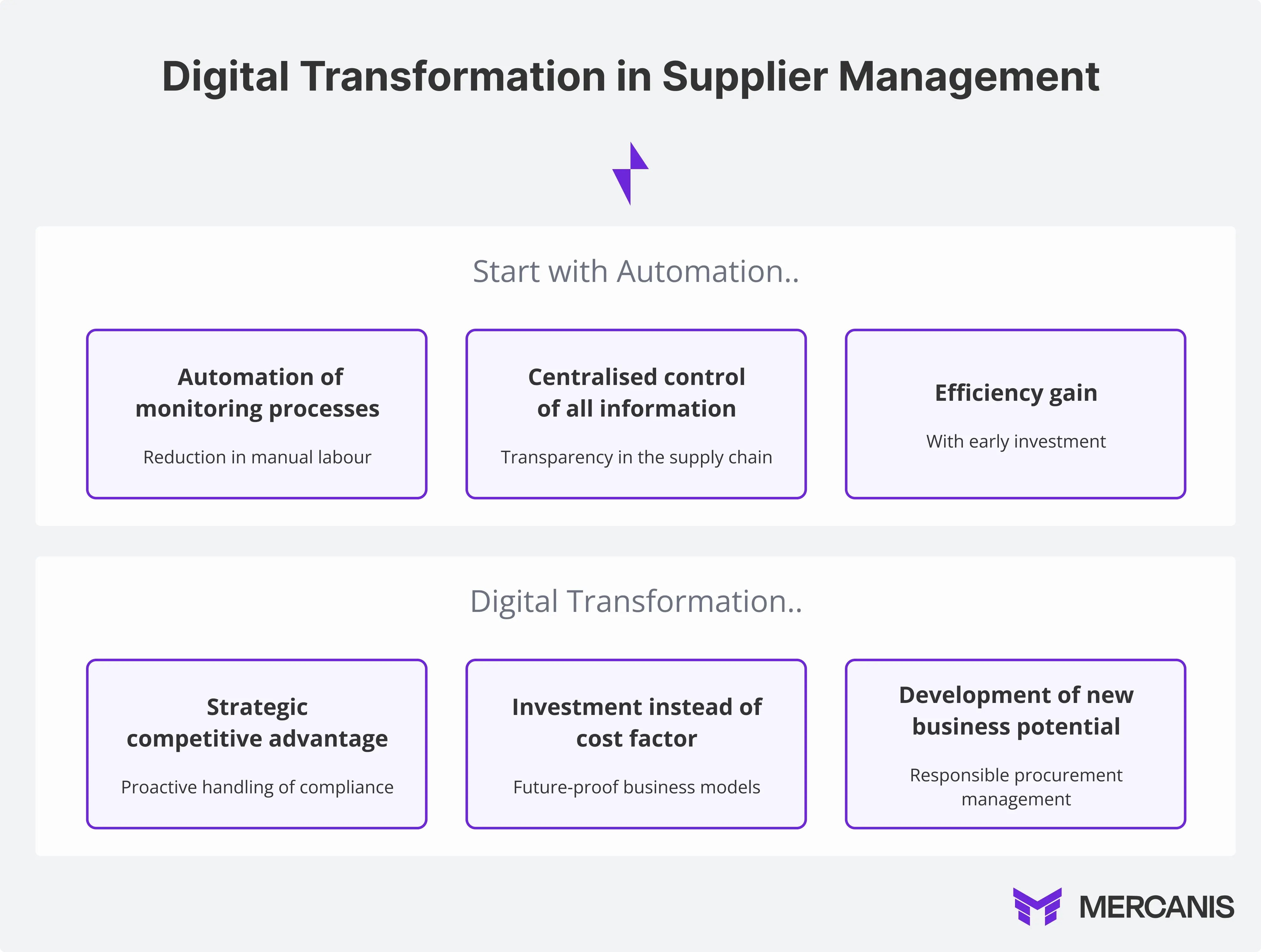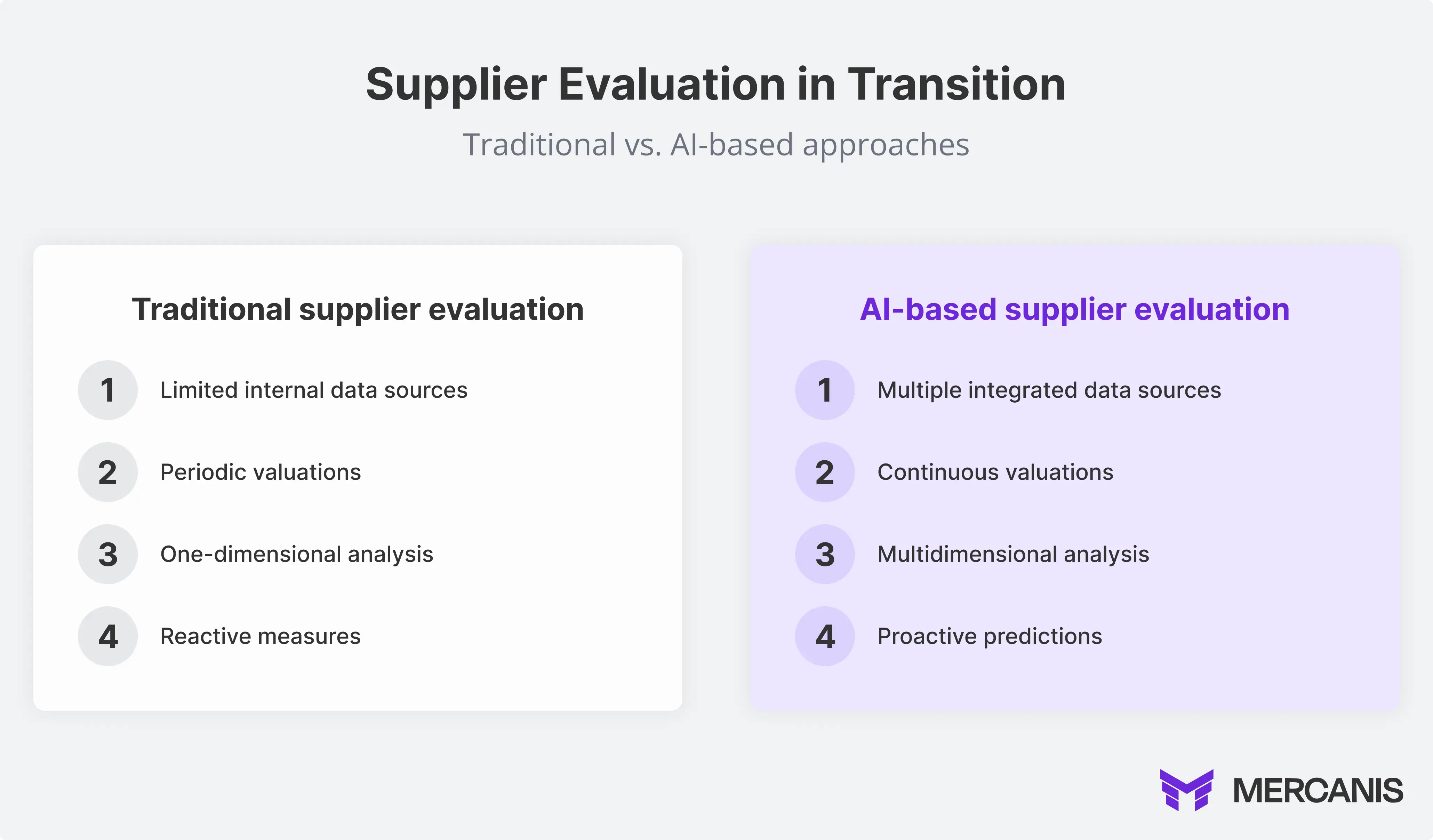Free Masterclass | The 10x Buyer: How to Make Your Procurement Team 10x More Productive with 55 AI Agents
Register now
- SolutionsOn Demand
- ExploreLearn
- Customers
- For Suppliers

In recent years, supplier management has evolved from an operational task to a key strategic function. Modern companies are faced with the challenge of not only optimizing costs and quality, but also meeting complex compliance requirements, which are constantly increasing. Today, the ability to manage supplier relationships effectively is crucial to a company's success - especially in times of volatile markets and global supply chains.
The evolution towards strategic supplier relationship management (SRM) reflects this development. Originally, it was primarily about price negotiations and order processing. Today, supplier management covers the entire spectrum from strategic selection and supplier onboarding to continuous performance monitoring and risk management. The integration of legal requirements and sustainability targets, which are no longer optional but mandatory, is particularly challenging.
Effective supplier management systems are characterized by a central supplier database with complete and up-to-date information, structured processes for supplier selection and qualification and systematic evaluation mechanisms for supplier performance.
The increasing density of regulation in particular is presenting companies with new challenges. The requirements for supplier management and compliance specifications have multiplied and require new approaches to implementation. This complexity can hardly be managed without digital tools - a trend that is set to intensify in the coming years.
This growing complexity makes it necessary to take a closer look at current and future regulatory requirements in order to establish a future-proof procurement management system.
The regulatory landscape for supplier management is undergoing profound change. Current legal requirements such as the Supply Chain Duty of Care Act (LkSG), the European Framework for Environmental, Social and Governance (ESG) and the General Data Protection Regulation (GDPR) are creating a complex set of requirements for companies of all sizes. We observe that medium-sized companies in particular often underestimate how far-reaching these regulations will affect their procurement processes, even if they do not fall directly under the scope of application. These regulations have a direct impact on the design of global supply chains and require a fundamental realignment of procurement processes.
Legally compliant supply chains: The implementation of the Supply Chain Due Diligence Act
The LkSG obliges companies with more than 1,000 employees (from 2024 already from 500 employees) to comply with human rights and environmental due diligence obligations along their entire supply chain. The core elements of the law include the establishment of risk management, the implementation of preventative measures and the establishment of a complaints mechanism for those affected.
Practical implementation poses considerable challenges for many companies. The complexity of modern supply chains with often hundreds or thousands of suppliers makes manual compliance management almost impossible.
ESG compliance as a competitive advantage in supplier management
Alongside the LkSG, ESG compliance (environmental, social, governance) is becoming increasingly important. The growing demand for sustainable products and services is making ESG criteria a decisive differentiating factor, while pressure from investors is making ESG criteria a decisive factor in supplier relationship management. Companies that are pioneers in this area secure long-term competitive advantages.
The EU central legal basis for this. Corporate Sustainability Reporting Directive (CSRD) forms a It obliges companies to report transparently on their ESG performance. This will initially affect large companies from the 2025 financial year, capital market-oriented SMEs from 2026 and, gradually, other SMEs from 2027. Purchasing departments are required to systematically record ESG-relevant information such as CO₂ emissions, working conditions and environmental impact and integrate it into company-wide sustainability reporting.
In addition, suppliers must be evaluated according to clearly defined ESG criteria - for example in relation to ecological risks, human rights standards or governance aspects such as corruption prevention. ESG due diligence processes must be integrated into purchasing processes in order to meet legal and regulatory requirements. This includes structured risk analyses, preventative measures and comprehensible documentation within contract and audit structures. ESG-compliant supplier management thus becomes a prerequisite for legally compliant and sustainable procurement.
Data protection-compliant supplier relationships in the digital economy
Another critical compliance area concerns data protection. The GDPR places high demands on the handling of personal data - including in cooperation with suppliers. The risks in this area are manifold:
Especially in the context of international supply relationships, complex requirements arise for the legally compliant organization of cooperation. The integration of data protection requirements into procurement management is therefore becoming a strategic necessity.
.webp)
Now that we have understood the complex requirements, the question arises: how can companies overcome these diverse compliance challenges in practice? In the following, we look at effective solutions.
Regulatory requirements act as a catalyst for digital transformation in procurement. Companies that tackle these challenges proactively can use the necessary changes to gain a strategic competitive advantage. Compliance requirements should not be seen as a cost factor, but as an investment in future-proof business models. This is not just about avoiding risks, but also about tapping into new business potential through responsible procurement management.
The complexity of modern compliance requirements makes innovative approaches to procurement management essential. Digital solutions offer decisive advantages here through the automation of monitoring processes and the central control of all relevant information. Our experience shows that companies that invest in digital compliance solutions at an early stage can reduce implementation costs by up to 40% compared to companies that only react under time pressure. Modern software platforms enable the continuous collection, analysis and documentation of compliance data across the entire supply chain.
The most important functions of such systems include automated risk assessments based on defined criteria catalogs, real-time monitoring of compliance indicators and early warning systems and workflow-controlled processes for corrective measures in the event of deviations.
A German-language infographic titled "Digital Transformation of Supplier Management" illustrates how digital tools enhance compliance and efficiency. The graphic includes three upper boxes highlighting strategic advantages: competitive edge, investment focus, and new business opportunities. These lead to three lower boxes showing benefits such as automated monitoring, centralized information control, and up to 40% efficiency gains. At the bottom, a dark blue banner emphasizes innovative compliance approaches with key functions: automated risk assessment, real-time monitoring, and workflow-driven processes

These technological solutions form the foundation for the practical implementation of the various compliance requirements in supplier relationship management.
The implementation of the LkSG with digital supplier management enables a structured approach to fulfilling the legal requirements. Key elements include the digital recording and classification of all suppliers according to risk categories, automated self-disclosures to identify risk areas and continuous monitoring of relevant key figures.
ESG implementation with digital supplier management offers similar advantages. The focus here is on the integration of ESG criteria into the supplier selection and evaluation process, systematic recording of sustainability indicators and transparent reporting.
GDPR implementation with digital supplier management also benefits from modern technology solutions. Critical functions in this context include the central management of all data protection-related agreements, automated verification of compliance with data protection standards and secure collaboration platforms for the exchange of sensitive information.
However, implementing such digital solutions is only the first step. In the next section, we look at how AI and advanced analytics are revolutionizing supplier management.
Traditional approaches to evaluating supplier performance are reaching their limits given the complexity of modern supply chains. Manual assessments are time-consuming, subjective and often limited to historical data. They offer little opportunity to identify risks at an early stage or proactively exploit potential. At a time when market conditions and requirements change almost daily, a purely reactive approach is a significant competitive disadvantage.
The main limitations of conventional methods in supplier management lie primarily in their lack of timeliness, as assessments are often only carried out in long cycles (often once a year). There is also a lack of integration of different data sources, which makes it almost impossible to obtain a holistic view of supplier performance. Added to this is the limited scalability of traditional approaches, which quickly reach their limits with extensive supplier portfolios.
Artificial intelligence and modern analysis technologies open up completely new perspectives for procurement management. They not only enable the automation of existing processes, but also create the basis for innovative approaches to evaluating and managing supplier relationships. The automated collection and consolidation of internal and external data sources enables continuous rather than periodic evaluation. Complemented by multidimensional scoring models with individually weighted factors, a precise, holistic picture of supplier performance is created, in real time and scalable.
The use of real-time analyses for supplier performance is particularly promising. These make it possible to continuously record and evaluate performance data so that problems can be identified and addressed at an early stage.
The most advanced systems we see in practice already integrate external data sources such as news feeds, financial data and even social media monitoring to create a comprehensive risk profile of suppliers in real time. AI systems can also recognize patterns that are not visible to human analysts. They identify correlations between various performance indicators and external factors that provide information about potential risks or areas for improvement. The added value of such solutions is particularly evident in the early detection of quality problems through trend analyses and precise forecasts for delivery dates based on historical data. With this understanding of the technological possibilities, the question now arises as to how companies can successfully implement such a future-proof system.

The transformation of existing procurement processes towards digital, compliance-oriented supplier management is associated with numerous challenges. Many companies fail due to typical pitfalls such as insufficient involvement of key stakeholders and a lack of integration into existing IT landscapes.
The success of digital transformation projects in supplier management depends primarily on people and less on technology. To overcome these obstacles, a structured approach with clear phases and milestones is recommended. A successful roadmap for the digitalization of supplier management includes the following steps:
1. Analysis and strategy
2. Solution design
3. Pilot implementation and rollout
Experience has shown us that the formation of a cross-functional implementation team with representatives from purchasing, compliance, IT and the specialist departments is a critical success factor. This team should report directly to the management in order to have the necessary assertiveness. Successful implementation also requires the right balance between technological, procedural and organizational aspects.
With a structured implementation, companies lay the foundation for future-proof supplier management that is far more than just a compliance tool - it becomes a strategic competitive advantage.
The complexity of modern supply chains and increasing regulatory requirements have made procurement management a core strategic function in companies. The successful integration of compliance requirements such as LkSG, ESG and GDPR into procurement processes is no longer just a question of legal conformity, but a decisive competitive factor.
Companies that establish future-proof supplier management benefit in several ways:
Supplier management and compliance requirements should not be seen as a chore, but as an opportunity for transformation. The digitalization of procurement management is no longer an option, but a strategic necessity for every future-oriented company. The necessary investments in digital tools and new processes pay off in the long term through improved supplier relationships, reduced risks and optimized procurement processes.
In a time of increasing economic uncertainty, resilient and compliant supplier management is becoming a decisive success factor. Companies that invest in the appropriate structures and technologies now will create the basis for long-term success - regardless of the challenges that the future may bring.


A digital supplier management system enables structured capturing, evaluation, and monitoring of suppliers across the supply chain. In line with the German Supply Chain Due Diligence Act (LkSG), it helps companies manage risks, monitor performance, and document human rights and environmental due diligence obligations—automatically and audit-proof.

By embedding ESG criteria (Environmental, Social, Governance) into supplier selection, assessment, and monitoring. Digital tools centralize ESG data, score suppliers based on clear sustainability metrics, and facilitate transparent ESG reporting in line with the CSRD.

AI analyzes large volumes of internal and external data, detects risks early, and delivers predictive insights on supplier performance. It automates repetitive tasks and improves decision-making throughout the Supplier Relationship Management (SRM) process.

Modern platforms offer workflow-driven processes, automated risk scoring, real-time monitoring, and automatic alerts in case of deviations. This reduces manual effort and ensures reliable compliance with legal requirements.

Companies that implement ESG criteria proactively not only meet legal obligations but also enhance their appeal to investors, business partners, and customers. Responsible sourcing strengthens supply chain resilience and corporate reputation.

A centralized portal consolidates all relevant supplier data, facilitates structured self-assessments, classifies risk levels, and documents preventive and corrective measures transparently. This simplifies compliance and reporting requirements.

By continuously collecting data (e.g., delivery times, quality metrics, ESG KPIs) and analyzing it in a digital dashboard. Deviations and risks are visible immediately, enabling proactive responses instead of reactive annual evaluations.

Alongside the LkSG and CSRD, GDPR and sector-specific sustainability regulations are gaining momentum. Companies should invest early in digital systems to build compliant, transparent, and resilient supply chains.

Through centralized contract and data agreement management, secure collaboration platforms, and automated checks of technical and organizational data protection measures within supplier relationships.

Key steps include: assessing the current state, defining objectives, selecting the right technology, running pilot projects, involving all relevant stakeholders, and providing continuous training. A cross-functional team from procurement, IT, and compliance is critical to success.
Fabian Heinrich is the CEO and co-founder of Mercanis. Previously he co-founded and grew the procurement company Scoutbee to become a global market leader in scouting with offices in Europe and the USA and serving clients like Siemens, Audi, Unilever. With a Bachelor's degree and a Master's in Accounting and Finance from the University of St. Gallen, his career spans roles at Deloitte and Rocket Internet SE.